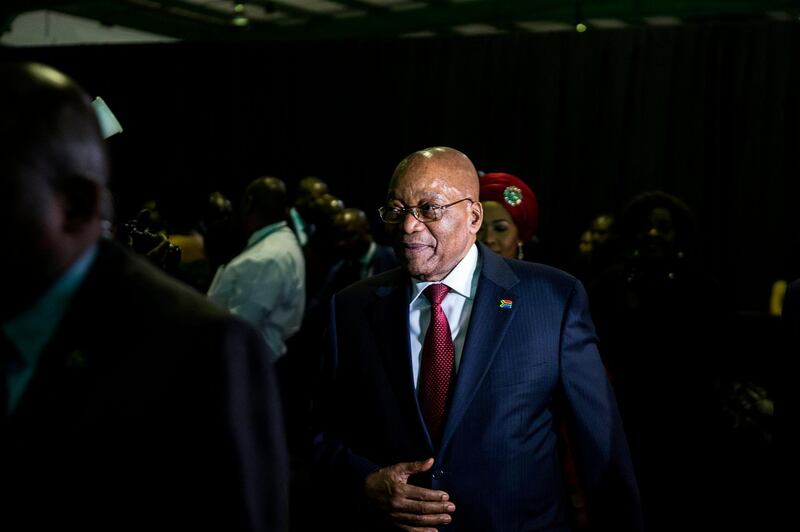With tapestries on the walls and ornately carved furnishings, the residence of the South African president in Pretoria is a serene perk of office.
A few years ago, while on an assignment to interview Jacob Zuma, it was obvious that not even this retreat could screen off the tumultuous personal dramas for his presidency.
In one of the hallways a distraught woman sat pleading with the presidential aides for access to someone she called Baba. “I have to see him, I have to: the cheque bounced.”
While the subject of the pleas was never identified, the intervening years have highlighted the undertow of financial concerns dominating the Zuma presidency.
South Africa has drifted unreformed and barely governed as its leadership has lost authority. Incredibly this weekend there is an outsize chance that the country, or at least the ruling African National Congress, could sign up for yet more of the same.
Five years ago when Mr Zuma sought a second term, he was already a tainted figure. The allegations, later borne out, that state funds had been misdirected to his own rural property to fund a lavish refurbishment, were but one of the bleeding wounds of his leadership.
The ANC endorsed him nonetheless and South Africa has suffered. There are now 783 corruption charges against him. Newspapers are filled with warnings about state capture as well-connected allies of the president secured lucrative business concessions from government.
______________________
Read more from Opinion
[ Hessa Al Ghurair: Vision 2021 sends a strong message to enhance skills and find local talent ]
______________________
The ANC can select Cyril Ramaphosa when voting starts today. He is a character of a different order to Mr Zuma. He represents a link to what the ANC could have been as the party of government had it not squandered so much.
A trade unionist turned businessman, he has prospered from the transition from white to black rule. One of his credentials is an endorsement from Nelson Mandela as the best man in the ANC.
As current vice-president, Ramaphosa has bided his time. The danger is that he is outflanked.
The smart money this weekend is the mantle of ANC will go instead to Mr Zuma’s former wife Nkosazana Dlamini-Zuma.
As a former head of the African Union and cabinet minister, she has strong claims to the job. There is little doubt that her selection by the party would represent a determination not to reverse the direction taken under Mr Zuma. Indeed, her task is to ensure his misdeeds are not prosecuted.
There are many who point to neighbouring Zimbabwe to highlight the slippery slope that faces South Africa.
But South Africa is not Zimbabwe. South Africa is an inherently more violent and more volatile society.
And because of its advantages, South Africa has much more to lose.
Just to keep the lights on, it needs to attract large capital investments. To unleash the potential of its 40 million plus people, it needs efficient government. None of these are on offer under Ms Dlamini-Zuma
Reports last week said that delegates to the ANC were being bought in blocks for 100,000 rand (Dh27,939) a head. Given the sums and the fact the number of delegates is about 5,000, the potential returns from vote buying vastly exceeds the cost.
The biggest ANC provinces are strongholds for Mr Zuma. In fact Mr Ramaphosa’s best bet maybe to offer a Zuma-aligned powerbroker the position of his deputy. That would guarantee a front row place in the succession next time round.
Should the internal ANC dynamic result in the opposite outcome, the obvious corollary is the country should go beyond its ranks for leadership.
That amounts to a daunting choice. There are many in ANC that still hold to its ideals. As the party of perhaps the bitterest liberation of all, the South Africa needs the ruling party.
The pressures for land redistribution and the enlargement of opportunity are channeled through its ranks. Even more radical solutions are peddled by red beret wearing militants that now have a seat in parliament.
The opposition is tainted by the accusation of white bias.
There is no doubt that it could hold power and be a more efficient administrator. Choosing that opposition would be a rebirth for South Africa — if it was successful.
The probability that it would open up a maelstrom of street protests, land invasions, targeted killings of the wealthy and more would also weigh heavily on voters.
What then of Mr Ramaphosa? Mr Mandela’s dreams for his protege can see fruition. The only route may be that “Cyril” runs against the ANC in the presidential election in 2019.
Many questions stand in the way of this outcome, not least if Mr Ramaphosa, schooled in the Leninist traditions of the ANC, would really take on his comrades.
From either inside the ANC or out, someone must return South Africa to the ideals of Nelson Mandela.





